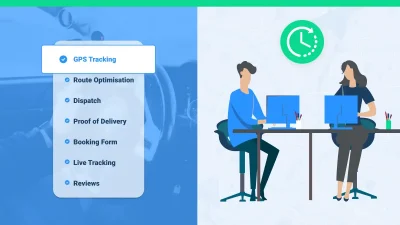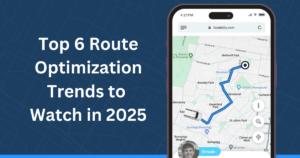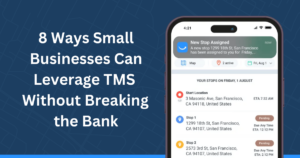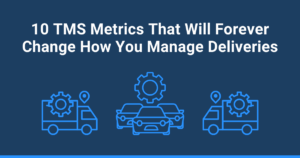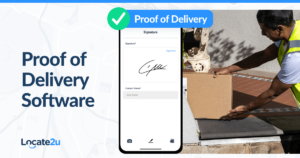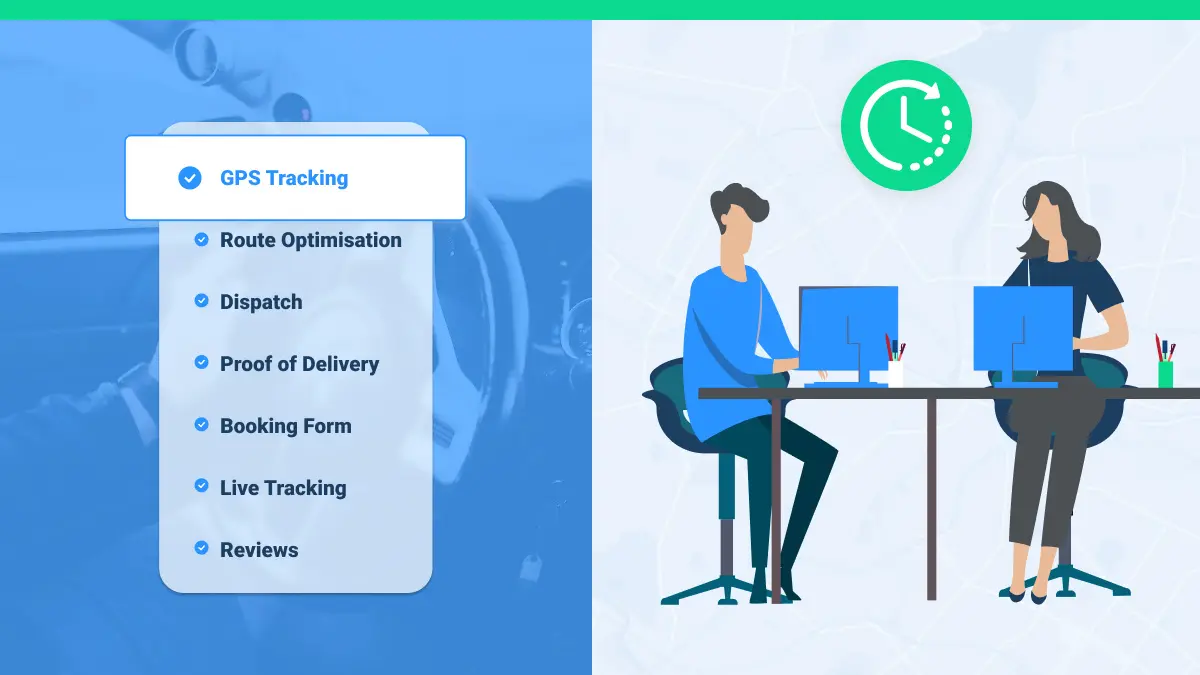
The impact of delivery management software on last-mile delivery has been significant, as businesses look to optimize their delivery operations and improve the overall delivery experience for their customers.
With the growth of e-commerce and the increasing demand for fast and reliable last-mile delivery, businesses are turning to efficient last-mile delivery software to streamline their operations and reduce delivery costs associated with inefficient delivery routes and delays.
In this article, we will explore the features and capabilities of delivery management software, examine its impact on last-mile delivery, and provide guidance on key considerations when choosing delivery management software and best practices for implementation and use.
What is delivery management software?
Software for logistics that is used to automate and streamline the delivery management process is called delivery management software. It offers companies a single platform for managing their delivery operations, from dispatching and route planning to tracking and monitoring deliveries in real-time.
Software for delivery management has the following features and abilities:
Route optimization
The capacity of delivery management software to optimize delivery routes to cut down on trip time and distance is one of its primary benefits. The most effective delivery routes are then generated using sophisticated algorithms that consider variables including traffic patterns, delivery windows, and truck capacity.
Dispatching and scheduling
Delivery management software makes it simple for businesses to dispatch and schedule deliveries for their drivers, ensuring that each driver is aware of their individual delivery routes and schedules.
Real-time tracking and monitoring
Businesses can track down where their drivers are at any given moment and can learn the status of deliveries thanks to delivery management software, which offers real-time tracking and monitoring of deliveries.
Proof of delivery
Electronic proof of delivery is a feature that many delivery management software solutions offer, enabling drivers to get client signatures and other details right on their mobile devices.
Communication with customers
Delivery management software enables companies to notify clients on delivery progress, expected delivery dates, and other information in real time.
Analytics and reporting
Businesses can identify areas for improvement and gradually enhance their operations by using the thorough analytics and reporting on delivery performance that delivery management software offers.

Impact of delivery management software on last-mile delivery
Delivery management software is an effective tool for businesses that rely on last-mile delivery to get their items into customers’ hands. By automating and optimizing the delivery process, businesses can lower costs, boost output, and enhance the customer experience.
Improved route planning and optimization
Better route planning and optimization: To establish the most effective delivery routes possible, delivery management software employs sophisticated algorithms that take traffic patterns, delivery windows, and vehicle capacity into account. By reducing travel time and distance, firms can save a lot of money and deliver goods more effectively.
Real-time tracking and monitoring of deliveries
Real-time delivery tracking and monitoring is possible owing to delivery management software, which also provides businesses with access to real-time driver position data and delivery status updates. Businesses may improve customer satisfaction while reducing the likelihood of missed or delayed deliveries thanks to the real-time identification and resolution of delivery issues.
Enhanced customer communication and experience
Improved customer interaction and communication: arrival management software enables companies to interact with consumers in real-time, updating them on the progress of deliveries, expected arrival dates, and other details. This aids companies in giving customers a more tailored and responsive experience, enhancing their pleasure and loyalty.
Increased productivity and efficiency
Delivery management software can assist firms in enhancing productivity and efficiency by automating and optimizing the delivery process. Businesses can handle more deliveries with fewer staff thanks to this, which lowers costs and boosts profitability.
Reduced delivery times and costs
Delivery management software can assist organizations in reducing delivery times and costs by optimizing delivery routes, enhancing delivery effectiveness, and lowering the risk of lost or late deliveries. Businesses may benefit from significant expense reductions and revenue growth as a result of this.
What to consider when when choosing delivery management software
Businesses that rely on last-mile delivery to get their goods into customers’ hands must be sure to use the right delivery management software. When evaluating different delivery management software options, businesses need to consider a number of crucial factors to make sure they choose a system that will meet their needs. These components include:
Features and capabilities
The features and capabilities offered by various delivery management software systems vary. When choosing a solution, businesses should take into account their unique demands and objectives, including route optimization, real-time tracking and monitoring, proof of delivery, and customer communication capabilities.
Easy of use and implementation
When considering delivery management software, businesses should take these factors into account. The software should ideally be simple to use, quick to install, and easy to integrate with current systems and processes.
Cost
For the majority of businesses, cost is an important factor to take into account when selecting delivery management software. Businesses should look at the possible ROI and consider the different software options’ price models, such as per-user or per-delivery cost.
Customer support and training
It’s crucial for organizations to choose a delivery management software vendor that offers in-depth customer support and training. This group can include technical support, onboarding and training services, online tools, and technical assistance.
Integration with current systems
Organizations should think about how the delivery management software will interface with their current procedures and systems, such as order management and inventory control software.

Compare various delivery management software choices:
To choose which supply management software best suits their needs, businesses should compare a number of different solutions. This may involve assessing elements including features, cost, customer service, and user reviews. To examine and compare several possibilities, organizations may find it useful to create a comparison matrix.
The following inquiries should be made of delivery management software vendors:
Businesses should consider a number of factors when assessing delivery management software providers to make sure they select a system that will fulfill their goals. What features and capacities does the software offer is one important question to address.
- What is the software’s pricing structure and what are the associated costs?
- How simple is the software to use and put into practice?
- What training and customer service options are offered?
- Can the program be integrated with current procedures and systems?
- What is the vendor’s history of dependability and client fulfillment?
Businesses may select the delivery management software system that best suits their demands and enhances their last-mile delivery operations by taking into account these important considerations and posing the appropriate questions.
How to use and recommend supply management software
Businesses that depend on last-mile delivery to distribute their items to clients may find that implementing delivery management software changes everything. However, it is crucial to adhere to best practices for deployment and use in order to get the most out of delivery management software. Following are some crucial actions that companies may take to guarantee the effective adoption and use of delivery management software:
The following actions must be taken to successfully implement delivery management software:
Establish goals and objectives
Organizations should specify their aims and objectives before putting delivery management software into use. This can involve raising customer satisfaction, cutting expenses, or optimizing delivery performance.
Conduct a needs analysis
Companies should carry out a needs analysis to determine their unique requirements and confirm that the delivery management software they select satisfies those requirements.
Choose the best software provider
To find the software supplier that best meets their needs in terms of functionality, price, and customer support, businesses need to thoroughly evaluate each one.
Train team members
To ensure the successful use of delivery management software, employers should provide thorough training on software usage to their workers.
Test the software
Before delivering the software to all users, businesses should conduct a rigorous testing phase to identify and correct any bugs.
Observe these pointers to maximize the advantages of supply management software:
Use real-time tracking
The customer experience can be improved and delivery performance can be increased with the help of real-time tracking of deliveries.
Integrate with other systems
Businesses can streamline operations and boost productivity by integrating delivery management software with other systems like order management and inventory management software.
Track performance indicators
By keeping track of performance indicators like on-time delivery rates and delivery timeframes, organizations can spot opportunities for development and make data-driven choices to streamline their delivery procedures.
Best practices for enhancing last-mile delivery with the use of delivery management software
Optimize delivery routes
Businesses can cut travel time and distance on delivery routes by using delivery management software, which improves delivery performance and reduces costs.
Communicate with customers
Customer communication can be facilitated with delivery management software, which enables businesses to give consumers real-time information on the status of their orders as well as an estimation of when they will arrive.
Use of proof of delivery
Use proof of delivery elements to guarantee deliveries are completed successfully and accurately. This lowers the possibility of customer disputes or other problems.
Businesses may optimize their last-mile delivery operations and boost effectiveness, productivity, and customer happiness by adhering to these best practices and efficiently adopting delivery management software.
The future of delivery management software in last-mile delivery
As the need for last-mile delivery keeps increasing, delivery management software is positioned to play an increasingly important role in optimizing delivery procedures and enhancing the customer experience. The following are some potential changes and new delivery methods for the final mile, along with how delivery management software might support them:
Increased use of autonomous vehicles
Delivery management software will be required as the usage of drones and autonomous vehicles increases for organizing and monitoring such deliveries. These trucks must be tracked in real-time, and the application needs to be able to handle convoluted delivery routes.
Expansion of same-day and on-demand delivery
Delivery management software must enable the development of same-day and on-demand delivery by offering real-time view of inventory and delivery vehicles as well as dynamic route planning and optimization.
Integration with smart home technology
As the adoption of smart home technology rises, delivery management platforms will need to interact with these systems to offer customers convenient and secure delivery alternatives, including elements like automated entry and safe lockers.
Use of artificial intelligence and machine learning
Delivery management software will increasingly integrate artificial intelligence and machine learning to automate decision-making, forecast delivery times, and enhance delivery routes.
Focus on sustainability
By optimizing routes, cutting delivery times, and lowering fuel consumption, delivery management software will need to support initiatives to lessen the environmental impact of last-mile delivery.
Delivery management software will probably keep revolutionizing last-mile delivery in the future by enhancing effectiveness, output, and customer satisfaction. Businesses can make sure they stay competitive and meet customer expectations in a delivery landscape that is continually developing by utilizing emerging technology and trends and staying ahead of the curve.
Last mile delivery software: Conclusion
Last-mile delivery software has become an essential tool for businesses looking to optimize their delivery operations and reduce delivery costs. By enabling businesses to plan and optimize delivery routes, track deliveries in real-time, and improve communication with customers, last-mile delivery software has helped businesses to streamline their delivery operations and reduce costs associated with inefficient delivery routes and delays.
With the growing demand for fast and reliable last-mile delivery, businesses that fail to invest in delivery management software may struggle to compete and meet customer expectations. By adopting last-mile delivery software, businesses can improve the efficiency and productivity of their delivery operations while reducing delivery costs, ultimately improving their bottom line.
Last-mile delivery software is an important investment for businesses looking to optimize their delivery operations and stay competitive in a rapidly evolving delivery landscape. By leveraging the features and capabilities of delivery management software, businesses can streamline their delivery operations, reduce delivery costs, and enhance the overall delivery experience for their customers.

Last mile delivery software for your business
Locate2u, a fleet tracking and delivery management software, offers a range of features and capabilities to support last-mile delivery operations. With Locate2u, businesses can optimize routes, track deliveries in real-time, and communicate with customers seamlessly, improving the overall delivery experience for both businesses and customers.
Click here to start streamlining your delivery operations today!

